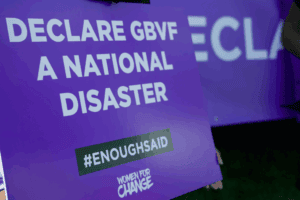The Policy Framework will conceptualise GBV and define its manifestation in terms of existing laws and policies.

Higher Health, through the Department of Higher Education and Training, will release a set of instruments that will further strengthen the realisation of the sectoral Gender-Based Violence (GBV) Policy Framework.
GBV Policy Framework
Published by Minister Blade Nzimande in July 2020, the Policy Framework intends to assist post-school education and training (PSET) institutions address the occurrence of GBV, and to provide a monitoring instrument to the department to assess the implementation of the Policy Framework.
The Policy Framework aims to:
- Conceptualise GBV and define its manifestation in terms of existing laws and policies;
- Detail the international and national regulatory framework compelling institutional and departmental responses to GBV;
- Provide guidance around the structures, mechanisms and processes that PSET institutions must put in place to address GBV;
- Compel PSET institutions to both create awareness of GBV, related policies and prevent incidents of GBV; and
- Set out a framework for oversight of the Department and PSET institutions’ development and implementation of GBV policy to address GBV in PSET system.
These instruments, which will be released on Friday, were developed by the PSET Gender-Based Violence Technical Task Team, which is led by Higher Health.
The task team comprises student leadership; vice-chancellors of 26 public universities; rectors of 50 Technical Vocational Education and Training (TVET) colleges; the Commission of Gender Equality, Department of Women, Youth and People with Disabilities; South African Police Services; SA Medical Research Council; and the executive leadership from the Department of Higher Education and Training, amongst others.
Over 50,000 students accessed support services
Higher Health Chief Executive Officer, Professor Ramneek Ahluwalia noted that during the Covid-19 pandemic in 2020/21, over 50,000 students accessed GBV support services, including personal risk assessments and referrals to professional health services.
“Over half a million young people have completed a curriculum on GBV prevention and mitigation. About 20 000 mental health crises were handled by Higher Health mental health and psychosocial services,” Ahluwalia said.
While he acknowledges significant measures and achievements, Professor Ahluwalia said much more needs to be done in terms of strengthening and promoting the services, in order to avert violence and prevent deaths due to murder and suicide.
ALSO READ: ‘Little has changed,’ say organisations as govt outlines plans to end GBV
‘Battles we must win’
He said, “We honour every individual whom we enable to recognise that they are at risk and whom we empower with knowledge and practical interventions so they become more confident, protected and safer in their place of study and residence.
“Improving the mental health and wellness of our students and staff and protecting them from GBV are battles we must win. We will do so by recognising that mental health is a legitimate concern, which must be addressed, and by uniting to condemn and stand up against gender-based violence.
“We will also persevere with initiatives that ensure the adoption and rollout of youth-friendly, easily accessible services and programmes across our universities and colleges, he added.
Psychologists deployed to Fort Hare University
Meanwhile, Higher Health is assisting the University of Fort Hare (UFH), through the deployment of a team of experienced Higher Health staff.
This follows the death of two law students last week, Nosicelo Mtebeni, who was brutally murdered, allegedly by her boyfriend, and another student who died after falling from a high-rise building.
“These seven psychologists, social workers and counsellors will provide counselling and care to affected students and staff with immediate effect. We are working closely with Professor Sakhela Buhlungu, the Vice-Chancellor of UFH, and with the South African Union of Students and appreciate their support for our involvement,” Ahluwalia said.
Ahluwalia highlighted other existing interventions and services, including the Higher Health toll free-24-hour student helpline 0800 36 36 36, have been scaled up to help the UFH community, and the mobile clinic service is on alert and on site to manage health emergencies, including mental health counselling and COVID-19 testing and related referrals.
Higher Health conveyed its condolences to the university, families and friends of the deceased.
“We have lost two bright young South Africans who had so much to contribute to the legal profession which they were about to enter, and to the higher education sector and our entire country. We lost Nosicelo to gender-based violence, and it is likely that we lost her peer to unbearable mental strain,” Professor Ahluwalia said.
“This dark hour underscores the fact that GBV and mental health are co-epidemics striking at our youth. It is essential that we continue to build infrastructure in all our universities and colleges so they can provide easy access to services and assistance to all students,” Ahluwalia said.
Higher Health is an entity of the Department of Higher Education and Training. Higher Health works in seven key areas to promote the health and wellbeing of students across South Africa’s public universities and technical and vocational training colleges.
NOW READ: Gender commission wants sexual-offences courts that Ramaphosa promised
Support Local Journalism
Add The Citizen as a Preferred Source on Google and follow us on Google News to see more of our trusted reporting in Google News and Top Stories.






